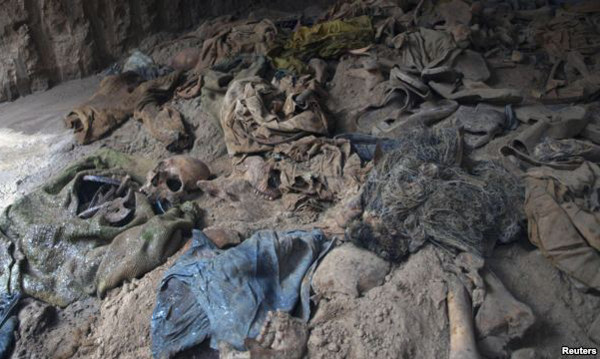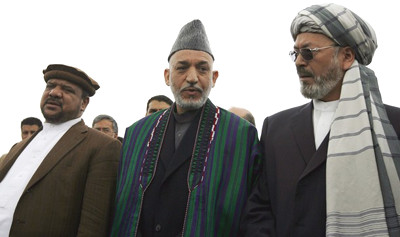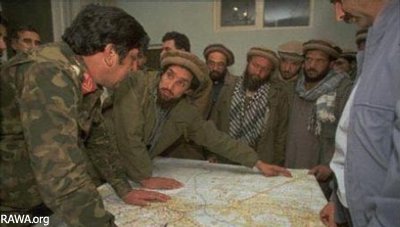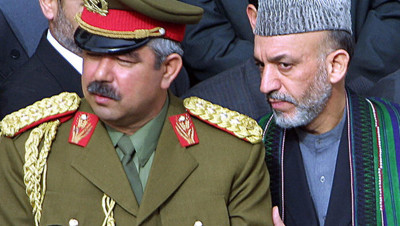By Frud Bezhan

Human skeletons and items of clothing are seen in a mass grave uncovered in northern Balkh Province in January 2012. Construction workers digging a car park found at least 10 human skulls. (Photo: Reuters)
Afghanistan’s former warlords and militia leaders have slammed the leaked findings of an unpublished report that implicates hundreds of them in atrocities committed during the country’s devastating civil war in the 1990s.
Titled "Conflict Mapping In Afghanistan Since 1978," the damning report accuses up to 500 members and leaders of rival ethnic and political groups, some of whom currently hold prominent government positions, of being involved in widespread human rights abuses from the communist coup and subsequent Soviet invasion of the late 1970s to the fall of the Taliban in 2001.

Hamid Karzai (C) with his two vice presidents Mohammad Qasim Fahim (L) and Karim Khalili (R). Both are mentioned in the report.
Details from the exhaustive 800-page report, compiled by Afghanistan’s Independent Human Rights Commission, have reignited debate over the country’s contentious recent history. With Afghanistan’s long-warring groups having written their own versions of events shaped by their own ideologies, a single narrative of what happened and who was responsible has proved elusive.
'Political Tool'
Sayed Hussain Sancharaki is the spokesman for the National Front of Afghanistan party, which is headed by various regional strongmen who once waged war against the Soviet Union and later the Taliban as leaders of Western-backed jihadist groups, collectively known as mujahedin. He has labeled the report, which implicates many party members as criminals, as biased and politically motivated.
“This report has been prepared by those who have given specific details about the holy war and mujahedin in Afghanistan without being involved in the war," he says. "All such reports should be balanced and accurate and not be used as a political tool.”
Sancharaki, like many other mujahedin, defends himself as a "freedom fighter," a title refuted by many ordinary Afghans. The 1992-96 civil war, which saw the mujahedin turn on each other, left hundreds of thousands of civilians dead, resulted in the rape of thousands of women and children, and left the country’s infrastructure in tatters.
Horia Mosadiq, Amnesty International’s Afghanistan researcher, was part of the 40-member team of Afghan researchers, with assistance from foreign forensic experts, who investigated alleged crimes and wrote the report over the last six years.
She says the report, details of which were recently released by "The New York Times," provides an authoritative list of the principal players in the wars of the last three decades, as well as insight into specific incidents, through evidence collected from more than 180 mass graves and the testimonies of thousands of survivors and witnesses.

Ahmad Shah Massoud (pointing at map), Qasim Fahim and other commanders of Shura-e-Nezar with Parchami (Russian puppets regime) army generals Nabi Azimi, Noor-ul-Haq Ulomi, Asif Delawar and others. He is one of many top names mentioned in the report. (Photo: RAWA.org)

Former ethnic Uzbek warlord Abdul Rashid Dostum, who is now the chairman of the Joint Chiefs of Staff of the Afghan National Army, is also named in the report. (Photo: Hoang Dinh Nam/AFP/Getty Images)
"This report has mapped the atrocities and human rights violations in Afghanistan and highlights the main incidents [of the past three decades]," Mosadiq says. "When the human rights commission was documenting the cases, people came up with names and they were identifying the perpetrators and saying whom did what to them. This is how the report is identifying hundreds of those perpetrators."
500 Afghans Named
Mosadiq adds that those accused of atrocities in the report -- including the massacring of civilians or prisoners and the indiscriminate destruction of towns and villages -- include some of the most prominent members of the current Afghan government.
In all, she says, some 500 Afghans are named in the report, including the country's revered national martyr, Ahmad Shah Masud, a Tajik warlord who held out against the Taliban before his assassination just before the September 11, 2001, terrorist attacks in the United States.
Other prominent names on the list include ethnic Uzbek leader Abdul Rashid Dostum, the current chairman of the Joint Chiefs of Staff of the Afghan National Army; former ethnic Tajik warlord and current first vice president, Field Marshall Mohammad Qasim Fahim; and Hazara militia leader and current second vice president, Abdul Karim Khalili.
The list also includes the names of former communist leaders and commanders of insurgent groups such as the Taliban, the Haqqani Network, and Hezb-i-Islami, some of whom are on the UN blacklist of terrorists.
Publication Blocked
But the report is unlikely to be released anytime soon, according to Mosadiq. Part of a reconciliation and justice effort ordered by Afghan President Hamid Karzai in 2005, the report was completed and submitted in December, only to see its publication blocked.
Mosadiq sees the hand of powerful members of parliament, cabinet ministers, and governors -- many of whom were named in the report as perpetrators of widespread human rights abuses -- as being behind the delay.
"The plan was that President Karzai would launch the report because it was considered as a national document, which highlighted the suffering of the Afghan people in the last three decades," Mosadiq says. "But unfortunately because of some political compromises that Karzai had reached with some, he didn’t publish the report."
Mosadiq adds that the decision to suppress the document coincided with the removal of several members of the Afghan Human Rights Commission. Karzai’s spokesman Aimal Faizi rejects any connection between the removals and the findings of the report, saying the president was entitled to remove the commissioners due to the expiration of their terms.
Despite conceding that the prospects for the publication of the report look dim, Mosadiq says its release is essential, insisting that without addressing its past Afghanistan cannot move on.
She says the lack of justice and responsibility over the crimes of the last 30 years has fueled an unending cycle of violence, with tribes, ethnic communities, and political groups -- including insurgent groups -- taking the law into their own hands in seeking justice.
"If we want to give people some level of accountability and justice," she says, "it's important for people to know what happened to them, who did it, why they did it, and to pressure the Afghan government to deliver this justice and accountability to the people of Afghanistan."



